FOSTERING A SUSTAINABLE FUTURE: HOW DBS IS REFLECTING ESG VALUES IN THE WORKPLACE.

HR TECH FESTIVAL ASIA 2023: GET READY TO NAVIGATE THE NEW PARADIGM OF PEOPLE AND WORK
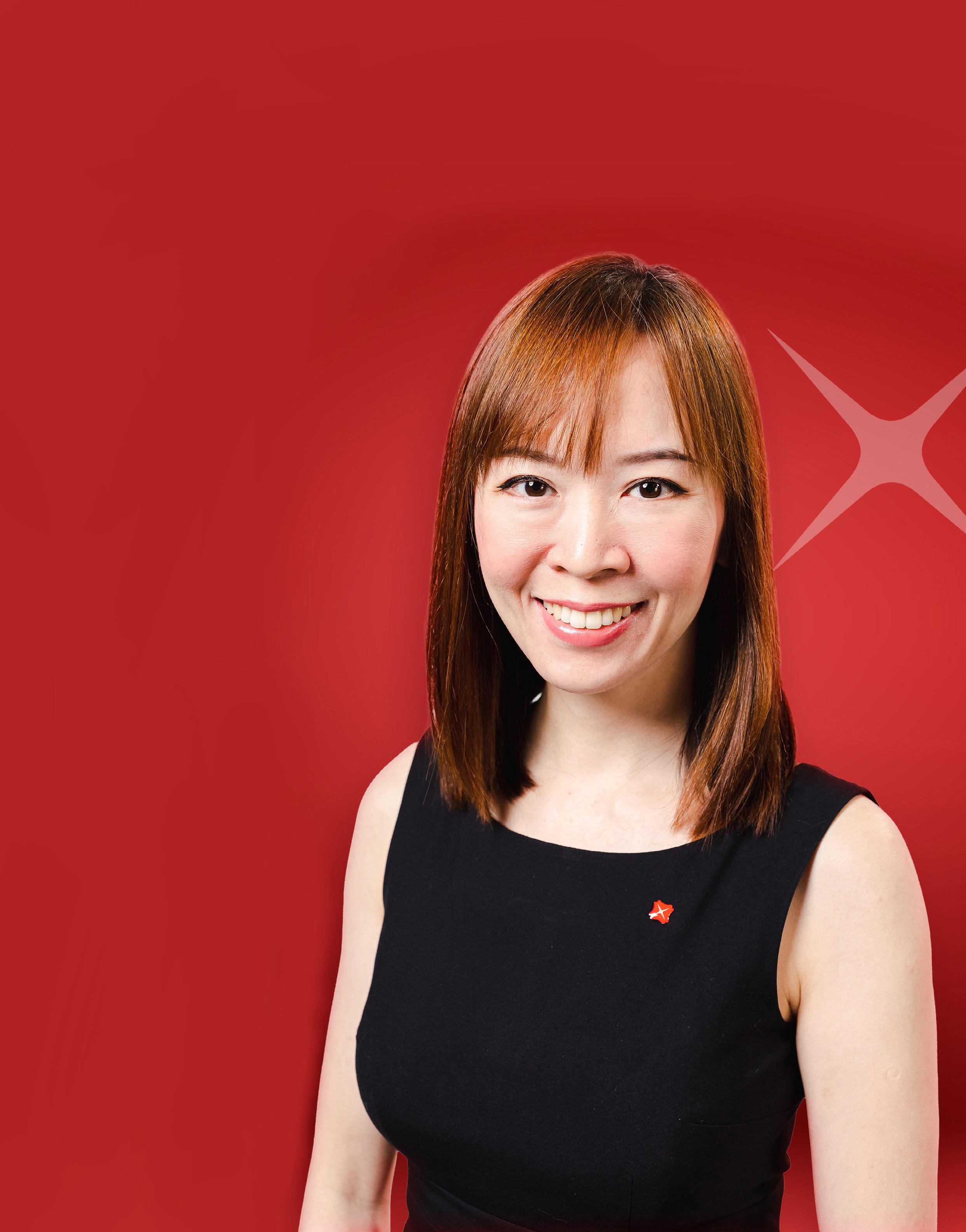
www.hrmasia.com FEBRUARYMARCH 2023 Price inc. GST $9.95
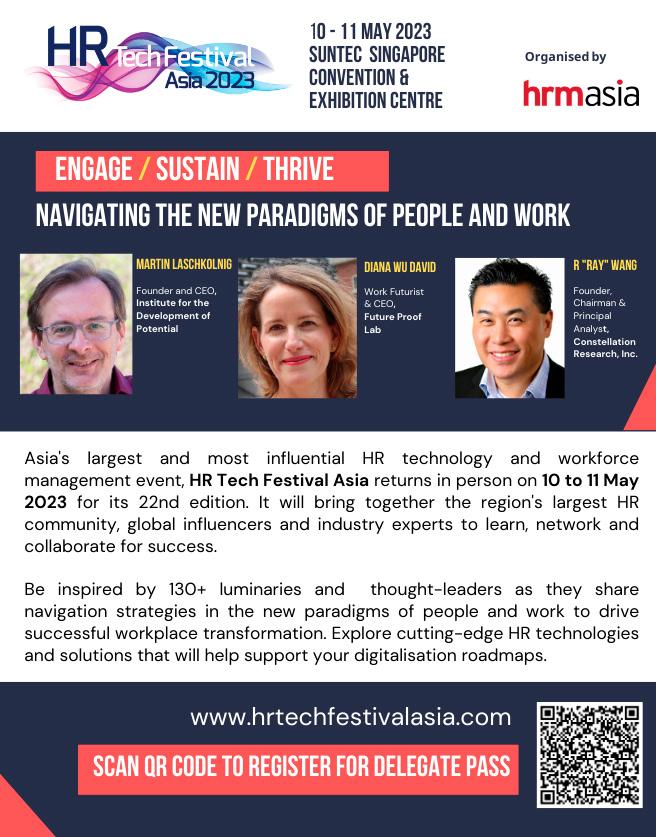
SENIOR JOURNALIST
Shawn Liew
JOURNALIST
Josephine Tan
GRAPHIC DESIGNER
Adrian Taylor
adrian.taylor@mac.com
SALES DIRECTOR
Luke Kasprzak
SENIOR ACCOUNTS MANAGER
Edwin Lim
MARKETING DIRECTOR
Phyllis Chua

MANAGING DIRECTOR AND PUBLISHER
Catherine Wong

Dear HRM Magazine Asia readers,
To be a more attractive proposition for investors, consumers, and employees alike, organisations are increasingly recognising the importance of integrating Environmental, Social, and Governance (ESG) frameworks into their business strategies.
In the banking and finance sector for instance, besides playing an increasingly important role in investment decisions, ESG has grown to be a critical component of the conversation around employee experience.
As Ng Ying Yuan, Chief Operating Officer for Group Human Resources, DBS, pointed out, organisations are now looking beyond the pursuit of profits at all costs, while employees are seeking purposeful careers that transcend monetary rewards.
In an exclusive interview with HRM Magazine Asia, Ng and Erwin Chong, Group Head of Corporate Real Estate and Administration, DBS, shared the Singapore bank’s commitment to sustainability and how this has won buy-in from employees.
A key part of DBS’ sustainability strategy evolves around creating a holistic employee value proposition that strives to create a supportive environment that allows employees to lead a fulfilled life and to Be the Best, Be the Change and Be the Difference.
As you find out more in this issue about the sustainability journey that DBS has embarked on, it is perhaps worthwhile for you, as CHROs, to consider how sustainable human capital management is driving ESG priorities in your organisation. We are also continuing our countdown
to HR Tech Festival Asia 2023, Asia’s largest HR technology and workforce management event.
With the theme of Engage. Sustain. Thrive. Navigating the New Paradigm of People and Work, HR Tech Festival Asia 2023 is taking place from May 10-11 at the Suntec Singapore Convention and Exhibition Centre.
Besides bringing together some 5,000 C-suite HR professionals, business leaders, government officials, HR tech analysts and influencers to discuss the most pertinent workplace issues faced by organisations in Asia, HR Tech Festival Asia 2023 will also feature a lineup of global and regional thought leaders and HR luminaries, who will provide key insights into what is shaping the way organisations work.
In this issue, you can read about how organisations are helping employees re-centre themselves at work as they seek serenity in times of uncertainty and how you might be able to harness the impact of the metaverse on the workplace.
If these topics pique your interest, we invite you to join Martin Laschkolnig, Founder and CEO of the Institute for the Development of Potential, Amer Iqbal, Founder and CEO of 5 Ways To Innovate, and more live at HR Tech Festival Asia 2023, and be part of the discussion on how Asia’s HR community can successfully navigate the new paradigm of people and work in 2023!
SHAWN LIEW, Senior Journalist, HRM Asia
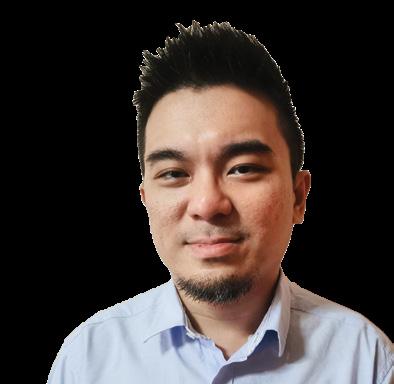

PUBLISHED BY
CONTACT US:
Read something you like? Or something you don’t? Perhaps there’s some insight we haven’t considered? Have your say on HRM Asia’s news, features, and contributions by emailing: info@hrmasia.com.sg
Shawn Liew Senior Journalist shawn.liew@hrmasia.com.sg
Josephine Tan Journalist josephine@hrmasia.com.sg.
EDITOR’S NOTE
FEBRUARY/MARCH 2023 HRM ASIA.COM 01
Pte Ltd
Pte Ltd, 2023. All rights reserved. Republication permitted only with the approval of the Publisher.
HRM Asia
109 North Bridge Road, #05-21 Singapore, 179097 Email: info@hrmasia.com.sg ©HRM Asia
CONTENTS
ON THE COVER
8
FOSTERING A SUSTAINABLE FUTURE: REFLECTING ESG VALUES IN THE WORKPLACE
Ng Ying Yuan, Chief Operating Officer for Group Human Resources, DBS; and Erwin Chong, Group Head of Corporate Real Estate and Administration, DBS, share the Singapore bank’s commitment to sustainability and how this has won buy-in from employees.
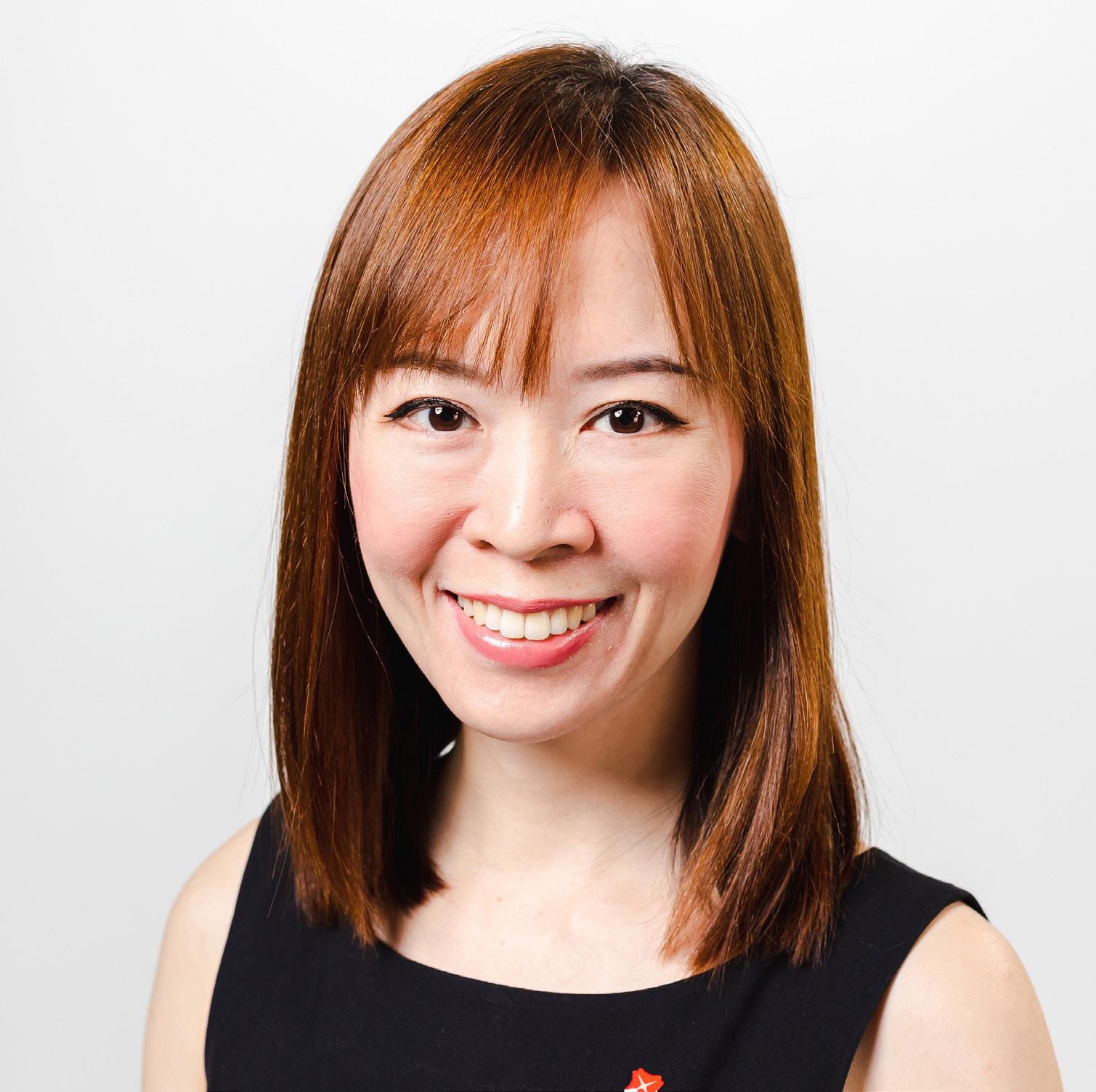
FEATURES
10
BUILDING RESILIENCE FOR UNCERTAIN TIMES
Rob Squires, VP of Sales for Asia Pacific and Japan, Ceridian, explains why organisations need a culture of change-readiness that is flexible enough to handle a variety of disruptions.
12 CREATING A WINNING EX FORMULA TO RETAIN YOUR BEST TALENT
Gavin Morse, Senior People Scientist, Culture Amp, shares how organisations can elevate employee experience to retain their best talent.
14 GET READY TO NAVIGATE THE NEW PARADIGM OF PEOPLE AND WORK
Taking place from 10-11 May, HR Tech Festival Asia 2023 will shine a spotlight on the most pertinent workplace issues faced by organisations in Asia.
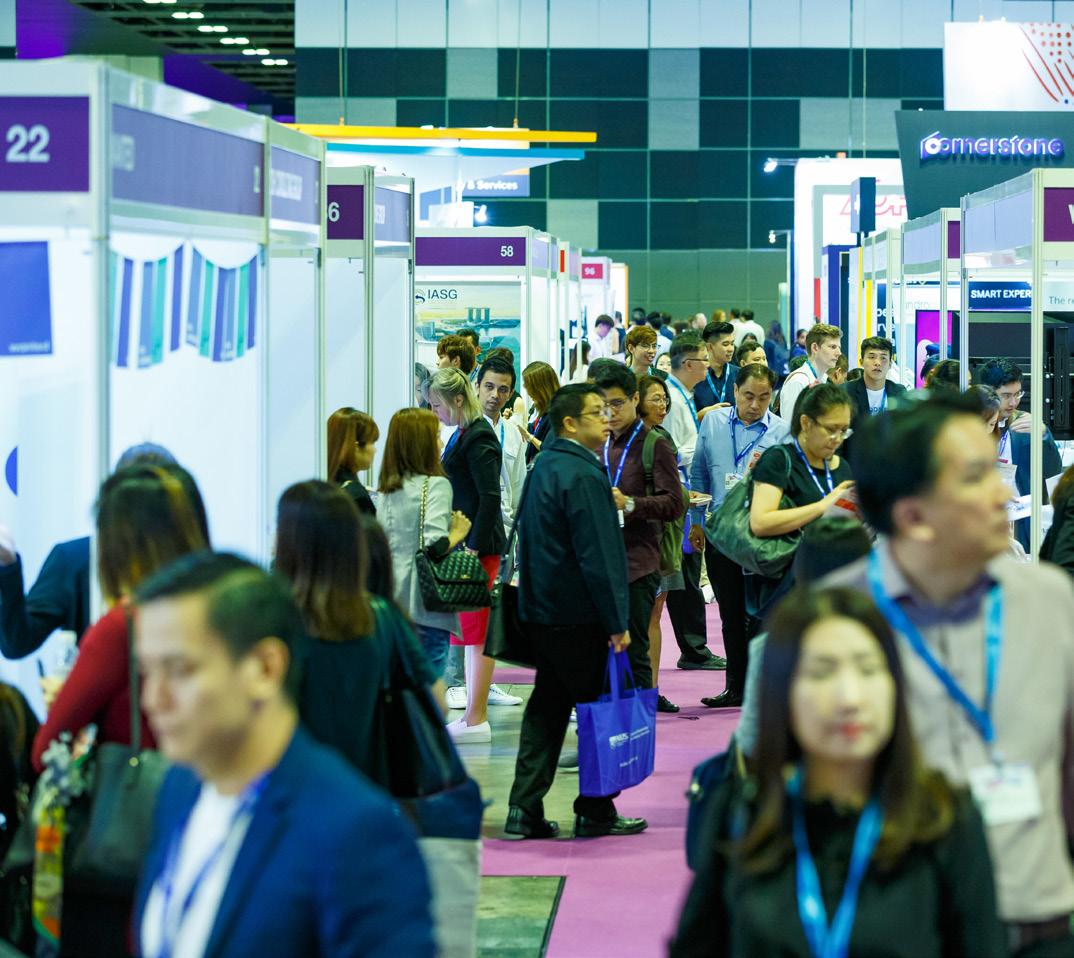
HRM ASIA.COM FEBRUARY/MARCH 2023 02
FEBRUARY-MARCH 2023
14
17 NEXT- GENERATIONAL MOBILITY FOR THE MULTI-GENERATIONAL WORKPLACE IN A POST- PANDEMIC WORLD
Rachele Focardi, Founder of XYZ@Work, shares how organisations can build the workforce of the future through Next Generation Mobility.
18 SERENITY IN TIMES OF UNCERTAINTY
Creating security is the first principle of creating an environment where people really want to engage and thrive, writes Martin Laschkolnig, Founder and CEO of the Institute for the Development of Potential.
20 IS THE METAVERSE OUR NEXT REALITY OR IS THE HYPE JUST VIRTUAL INSANITY?
Amer Iqbal, Founder and CEO of 5 Ways To Innovate, examines if the metaverse can be the next revolution that will transform the workplace.
22 PEOPLE EXPERIENCE AT THE HEART OF THE SONY EMPLOYEE JOURNEY
One of the best ways to retain talent is to align DE&I with employee experience, says Wendy Weehuizen, VP, People Experience, Asia and Middle East, Sony Music Entertainment.
24 BUILDING A SOCIALLY RESPONSIBLE WORKPLACE THROUGH EMPLOYEE DEVELOPMENT
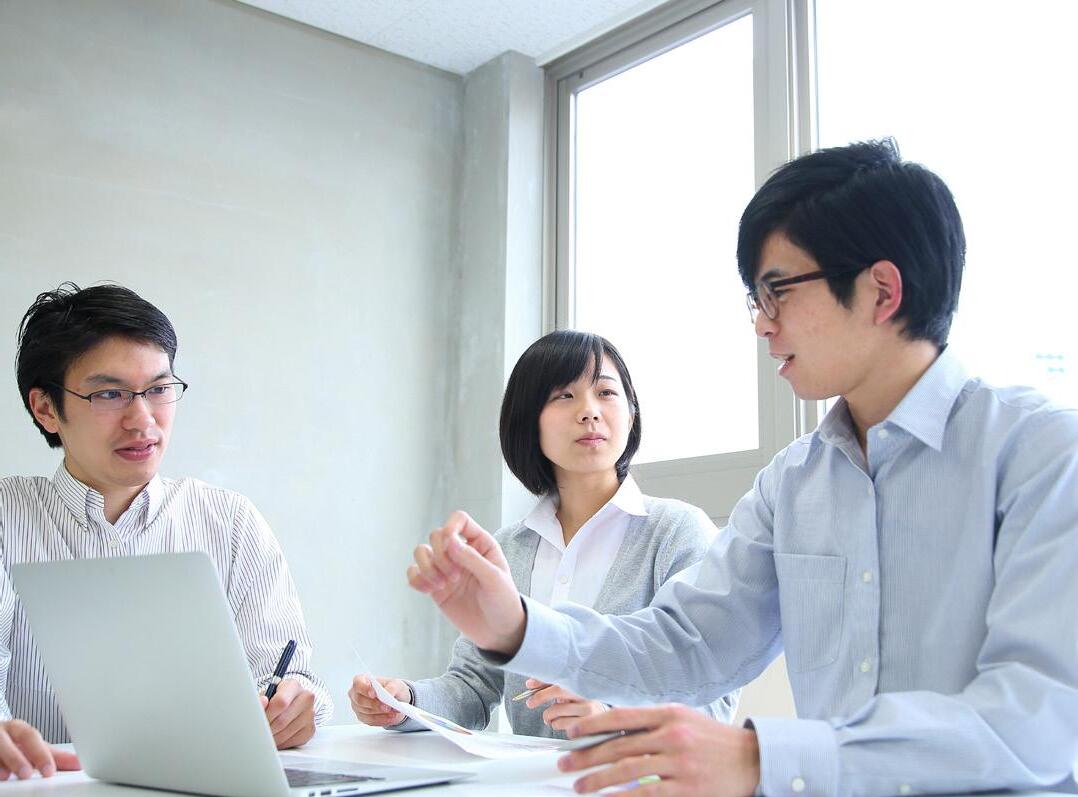
Dr Virgel C. Binghay, Co-Founding Member of the ASEAN Human Development Organisation (AHDO) Philippines, highlights how human development can be improved across organisations.
26
FUTURE-PROOFING THE WORKFORCE CAN START FROM WITHIN
Taking a skills-based approach to investing in the future of employees is the best enabler to future-proof an organisation, says Anne Fulton, Founder and CEO of Fuel50.

FEBRUARY/MARCH 2023 HRM ASIA.COM 03
WANT TO GET CONNECTED? Get in touch with us here facebook.com/HRMAsiaMag linkedin.com/company/hrmasia 18 04 ASIA NEWS 06 INTERNATIONAL NEWS 28 TWO CENTS REGULARS
info@hrmasia.com.sg
26
AUSTRALIA
AUSTRALIA AIMS TO CREATE DIVERSE FEMALE LEADERSHIP IN THE WORKPLACE
THE AUSTRALIAN GOVERNMENT is empowering more women of colour to reach their leadership ambitions with the launch of the Women of Colour Executive Leadership Programme.
The programme is designed to assist 20 diverse women, including Aboriginal and Torres Strait Islander women, to upskill and overcome the challenges they face in advancing their careers. Over the course of seven months, participants will engage in workshops, mentoring, and coaching to reach their goals.
Additionally, they will complete a strategic challenge project and improve their board capabilities.
SOUTH KOREA INVESTMENT IN ESG MANAGEMENT GROWS IN SOUTH KOREA
TO REDUCE AIR POLLUTION AND PROMOTE workplace safety, the top 100 companies in South Korea invested 5.44 trillion won (US$4.41 billion) in Environmental, Social, and Governance (ESG) management in 2022 This is an increase of 87.6% from the previous year, according to a Federation of Korean Industries (FKI) report.
The investments from large companies came at a time when their greenhouse gas emissions increased nearly 5% from a year earlier. Last year, these companies combined emitted 267.3 million tons of carbon dioxide equivalent, a 4.7% increase over the year before.
INCREASE IN OFF-HOURS WORK AMONG EMPLOYEES IN TAIWAN
TAIWAN OVER ONE-QUARTER OF EMPLOYEES in Taiwan are averaging 4.7 additional hours each month engaging in business-related activities outside regular working hours, according to an annual survey by the Ministry of Labour of Taiwan.
The survey, conducted from June 2021 to May last year, found that 25.2% of respondents had to engage in off-the-clock activities, an increase of one percentage point from the previous survey. These activities include receiving messages from employers via electronic communications methods such as phones, mobile phone apps, and social media.
NEWS ASIA 04 HRM ASIA.COM FEBRUARY/MARCH 2023
MORE EMPLOYEES IN SINGAPORE WORKING BEYOND RETIREMENT AGE
IN 2022, A TOTAL OF 207,300 Singapore residents aged 65 and above were employed, which translates to an employment rate of 31%. Of these, 81,900 (57.5%) were taking on full-time roles while a third were working part-time.
Where earning power is concerned, close to seven out of 10 elderly employees in Singapore earn less than $$2,500 (US$1,8885), according to figures provided by the Ministry of Manpower (MOM). 68.7% earned a gross monthly income of less than $2,500, about 27,000 elderly employees earned between $2,500 and $3,000 (US$2,262) while 37,800 earned at least $4,000 (US$3,016).
JAPAN
EMPLOYEES IN JAPAN ALLOWED TO PURSUE SIDE CAREERS
JAPANESE TRADING COMPANY
MITSUI is accommodating younger employees’ demand for more flexible work arrangements by allowing them to pursue side careers such as coaching, working on a tech start-up, or being a YouTuber or an artist.
A spokesperson from Mitsui said that the organisation has implemented remote work and flexible work hours and believes now is the right time to take a step further for employees to pursue both career development and new working styles.
MALAYSIA
MALAYSIA ADVOCATES FOR MORE WOMEN IN LEADERSHIP ROLES
DATUK SERI NANCY SHUKRI, Malaysia’s Minister of Women, Family and Community Development, has called for an increase in women’s representation in corporate leadership. Through advocacy, the minister wants both governmentlinked organisations and the private sector to meet a common target, as she explained, “It is our job to continue advocating as we have been saying that 30% of [female representation] has yet to be achieved in the private sector. It is not within our control, but we will keep advocating.”
According to the minister, the public sector in Malaysia has already exceeded its goal of having 30% of high-ranking positions held by women.
All Nippon Airways (ANA) meanwhile, has offered its flight attendants the option of working only two days a week, giving them the opportunity to have a side career.
FEBRUARY/MARCH 2023 HRM ASIA.COM 05
SINGAPORE
US NON-COMPETE AGREEMENTS CONTINUE TO BE DELIBERATED IN THE US
THE FEDERAL COMMUNICATIONS COMMISSION (FCC) has entered into a lengthy rule-making process that will determine if employees should be allowed to leave to work for a competing organisation.
According to the FCC, non-compete clauses are “exploitative” and unfairly limit the opportunities of an estimated 30 million Americans. Perhaps unsurprisingly, the FCC’s proposal has been challenged by the business community, including the US Chamber of Commerce, who called the move to outlaw no-compete agreements as “blatantly unlawful.”
UK
THINK-TANK CALLS FOR MORE EMPLOYEES IN THE UK TO BE INCLUDED IN PENSION SCHEME
THE SOCIAL MARKET FOUNDATION (SMF), an independent British public policy think-tank, has called for younger and lower-paid employees in the UK to be included in a scheme that sees people automatically enrolled into pension saving. Currently, all employers are required to offer a workplace pension to their staff, and automatically enrol those who fit certain criteria. They can include employees who are not already signed up to a workplace pension, earn at least £10,000 (US$12,020) annually, and are aged between 22 and 66. Employees can choose not to participate in the scheme.
UK FOUR OUT OF 10 EMPLOYEES IN UK WANT TO RESIGN
DESPITE AN UNCERTAIN JOB MARKET, four out of 10 employees in the UK are considering leaving their current employers, a new Mercer study has found.
Driven primarily by a desire for greater work-life balance, employees are looking for new roles, with fully remote workers and those working in the retail and hospitality industries the most likely to consider leaving their current roles.
The report also found that insufficient pay, burnout due to demanding workload, and poor relationships with managers and colleagues as the other top reasons behind employee turnover.
NEWS INTERNATIONAL HRM ASIA.COM FEBRUARY/MARCH 2023 06
UNEMPLOYMENT RATE IN THE US HITS RECORD LOW IN JANUARY
DESPITE FEARS OF A POTENTIAL RECESSION, the US added 517,000 jobs in January 2023, pushing the unemployment rate down to 3.4%, which represents the lowest rate since 1969.
This is largely going against most expectations, with a recent survey by research company Morning Consult highlighting that the majority of the US public believing the economy has already fallen into recession.
The hiring in January was largely led by bars and restaurants, with the car manufacturing and tech industries among those to report job losses.
PORTUGAL
90 COMPANIES IN PORTUGAL KEEN ON 4-DAY WORKWEEK
90 COMPANIES HAVE EXPRESSED INTEREST in participating in Portugal’s 4-day workweek trial, which is slated to run from June to December 2023.
According to Ana Mendes Godinho, Portugal’s Minister of Labour, Solidarity and Social Security, the companies come from sectors such as industry, commerce, information, and communication.
Late last year, the minister explained that authorities reserve the right to extend daily working hours of employees in the public sector benefitting from a shorter workweek. “The number of hours of daily work may be different on certain days,” she said.
EUROPE EMPLOYEES IN EUROPE SPENDING LESS TIME USING EMAIL
DRIVEN PARTIALLY BY THE INCREASED USE OF communication tools such as Slack and Microsoft Teams, employees in Europe are spending an average of 18.42 minutes per workday using email, which is 33% less than the 27.23 minutes employees in the US spend.
According to a study by productivity software DeskTime, the heaviest email users come from Malta, where employees spent 55.02 minutes on email daily. This is followed by 38.35 minutes daily for employees in Spain and 36.82 minutes for employees in Greece.
FEBRUARY/MARCH 2023 HRM ASIA.COM 07
US
FOSTERING A SUSTAINABLE FUTURE: REFLECTING ESG VALUES IN THE WORKPLACE
BY JOSEPHINE TAN
The employee experience (EX) has become a decisive factor in determining the success of a business. A positive work environment that provides meaningful work, resources, and support is crucial for keeping employees engaged and connected to their jobs. By focusing on EX, organisations can also foster a productive and fulfilling work culture that helps employees achieve their career goals.
Environmental, social, and governance (ESG) has become a key component in EX discussions due to its influence on an organisation’s culture and work environment. Aligning ESG with employee values, many organisations are finding out, improves employee satisfaction, engagement, and wellbeing, and improves talent retention.
With sustainability being a business priority today, many employers are also finding it necessary to reflect their ESG values across their organisation. When employees see these values reflected in their workplace, it not only instils a sense of pride in their efforts but also demonstrates that the organisation is actively contributing to a sustainable future.

In the banking and finance sector, ESG factors are playing an increasingly important role in investment decisions made by banks and financial institutions, which, in turn, impacts EX. DBS is an example of this trend, as the Singapore-headquartered bank has a longstanding commitment to sustainability, which dates back to its founding as the Development Bank of Singapore in 1968 to finance the nation’s development, said Ng Ying Yuan, Chief Operating Officer for Group Human Resources, DBS.
Speaking exclusively to HRM Magazine Asia, she added, “The past couple of years have been a tremendous opportunity to establish a
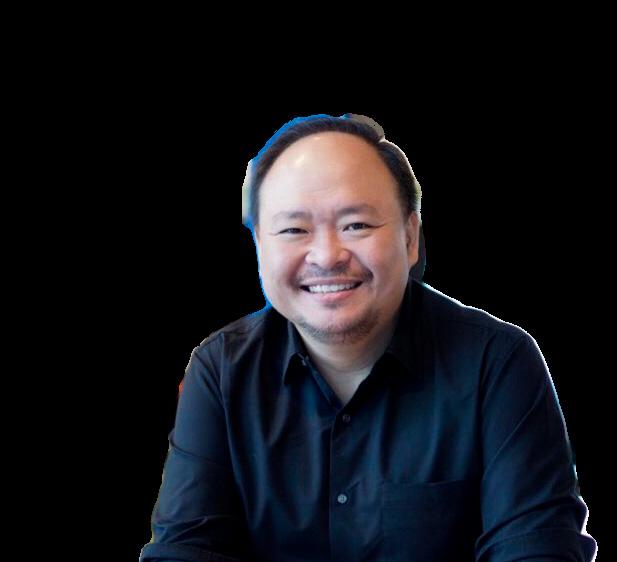
reset and rethink the role all of us, be it in the private or public sectors or as individuals, can play in making a greater difference for a better world. Organisations are increasingly looking beyond the pursuit of profits at all costs. Similarly, individuals are starting to see their jobs as more than a means to pay the bills and are instead seeking out purposeful careers.”
Ng shared that the bank’s employee value proposition centres around purpose and creating a supportive environment that allows employees to lead a fulfilled life. This is guided by the motto, “Be the Best, Be the Change and Be the Difference”, which empowers employees to create impact, improve lives and enable change beyond banking.
She described this as a “compelling competitive advantage” that gives DBS an edge in the competitive labour market when it comes to talent retention. Between 2021 and 2022, the level of voluntary attrition at DBS was similar to what it was before the pandemic and in some cases, lower than the market average in regions in which DBS operates.
FEATURE COVER STORY 08 HRM ASIA.COM FEBRUARY/MARCH 2023
“We hope to inspire our employees to lead more sustainable lifestyles and even become advocatessustainability in their own lives.”
ERWIN CHONG, GROUP HEAD OF CORPORATE REAL ESTATE AND ADMINISTRATION, DBS.
In July 2022, DBS officially opened its refurbished DBS Newton Green, Singapore’s first net zero building by a bank
Ng continued, “Our employees continue to choose to build their careers in DBS, and today, more than one-third of our job vacancies are filled by our own people. These speak to the attractiveness of our holistic employee value proposition, and in the industry, DBS is seen as the place to be if job seekers are looking to do purposeful, innovative work that intersects the finance, technology, and sustainability spheres.”
Driving green business continuity
Climate change, according to Ng, is one of the most pressing concerns of our time, and this has become a crucial aspect for businesses as stakeholders seek to partner with organisations that show their commitment to addressing it. She encourages organisations to take steps to futureproof their businesses and that of their workforce by prioritising climate change initiatives.

In Singapore, the government established the Singapore Green Plan 2030 as part of the nation’s efforts to drive economic growth and create jobs through sustainability. The Green Plan aligns with the United Nations’ 2030 Sustainable Development Agenda and the Paris Agreement and supports Singapore’s goal of achieving net zero emissions by 2050.
Against this backdrop, DBS will remain “purpose-driven and a trusted partner” to its customers and the community, Ng stressed, while doubling efforts to provide cutting-edge, sustainable banking solutions. “Our people are key enablers in this endeavour, and we will continue to nurture talent who can shape the future of banking for better environmental and social outcomes in Singapore and beyond.”
Particularly, DBS provides funding for investments that focus on renewable energy, climate adaptation technologies, and the shift to a circular economy. It has also been supporting its customers
in transitioning to more environmentally friendly operations and lifestyles by providing green and sustainable finance options.
“To create impact beyond banking, we are committed to being a force for good by championing social enterprises, which are organisations that aim to address critical social and environmental issues while achieving financial success,” she added.
Going green: For people and the community
To ensure employees are equipped with the necessary skills to be successful and aligned with ESG objectives, it is critical for organisations to prioritise upskilling. Incorporating green skills, which not only support sustainability goals but also provide a career advantage, is a crucial part of this process.
Ng acknowledged the significance of providing employees with up-to-date skills and knowledge, noting that this will enable them to grasp how sustainability can be incorporated into their work.
As an example, a Sustainability Learning Campus was established last year to house all sustainability-related training programmes offered by the DBS Academy, enabling employees to enhance their skills in a more holistic manner. By staying at the forefront of skills development, Ng is confident that DBS’ workforce is equipped to deliver effective solutions and support customers in meeting their sustainability objectives.

DBS has also embraced a sustainability strategy that is based on three pillars, namely responsible banking, responsible business practices, and creating impact beyond banking. Going beyond sporadic campaigns, the bank is determined to become a purposedriven institution and ensure that its commitment to this objective is integrated into the mindset of all its employees, shared Erwin Chong, Group Head of Corporate Real Estate and Administration, DBS.
Embedding sustainability into the daily employee experience and making it a default option is one of the approaches favoured by DBS, said Chong. He cited the example of the DBS Better World Café located at their Singapore headquarters, which incorporates sustainability elements into its food, design, and operation. Additionally, DBS has incorporated sustainable technologies and design principles into its premises, including a retrofit of one of its oldest office buildings, DBS Newton Green, which is now dubbed the first net zero building owned by a bank in Singapore.
Chong concluded, “We hope to inspire our employees to lead more sustainable lifestyles and even become sustainability advocates in their own lives. Going forward, we will continue to tap on behavioural science and ethnographic research to come up with more unobtrusive ways for employees to adopt more sustainable habits as they go about their usual routines in the office.”
FEBRUARY/MARCH 2023 HRM ASIA.COM 09
“Individuals are starting to see their jobs as more than a means to pay the bills and are instead seeking out purposeful careers.”
NG YING YUAN, CHIEF OPERATING OFFICER FOR GROUP HUMAN RESOURCES, DBS.
Building resilience for uncertain times
The resilience of every organisation has been tested in recent years by the global pandemic, the resulting shift to remote and hybrid work, and rampant inflation that has left many people in a cost-of-living crisis. Looking ahead, we are entering a period of economic uncertainty as central banks around the world raise interest rates and businesses across the spectrum look to control costs and reduce headcount.
In Ceridian’s latest Executive Survey, which polls 2,000 leaders from around the globe, respondents in Singapore said outdated technology (47%) and a lack of technology (38%) were the two largest barriers to managing disruptions within their organisation. HR leaders cannot know what tomorrow will bring, but they can adopt new technology to support strategic decision making with real-time data and prepare their people, leaders, and systems for potential disruptions ahead.
In this macroeconomic landscape, technology that can save money and provide accurate and accessible data is crucial for firms seeking efficiency and resiliency to withstand the unexpected.
Become change-ready
To stay ahead of the unexpected, organisations need a culture of changereadiness that is flexible enough to handle a variety of disruptions.
According to Ceridian’s research, three of the most impactful ways to build change-readiness into organisational culture are to:
• Implement DEI strategies to ensure different perspectives
• Provide flexibility when it comes to job roles and responsibilities
• Prioritise employee retention
While organisations see the value of building these into their culture, the data shows leadership’s actions are not keeping up. For example, 90% of respondents to our Executive Survey say their organisation has a DEI strategy – but only 33% say progress is being made (in Singapore, that
number rises to 38%). Only about half of respondents say they are creating internal training programmes or investing in technology to address skills gaps.
To be truly change-ready, organisations need to build these policies and programmes into their DNA. A comprehensive human capital management (HCM) strategy provides leadership with the data-driven insights to offer a modern employee experience and continuous learning opportunities that ensure their people have the skills for today, and when the unexpected arrives in the future.
Refresh the leadership pipeline
When it comes to weathering uncertain periods, having strong leaders in place is important. But just as important is a pipeline of talented people who are ready to step into leadership roles when needed.
While a vast majority (88%) of survey respondents say their organisations use succession planning, digging below the surface shows the potential for problems:
• 68% of respondents said they are very or extremely concerned about key leadership roles going unfilled when vacant.
• Almost half (43%) of key leadership roles are vacant for four months or longer. This rises to 51% in Singapore and 65% in Australia and New Zealand.
The results also found that roughly half of respondents are not using a technology solution to attract and retain talent or
identify employees that are a flight risk. In today’s globally competitive talent market, a holistic HCM programme can help organisations proactively identify and develop top employees, so you can fill roles before there is turnover and ensure that critical seats do not sit empty.
Prioritise agility
To support mission-critical business decisions, technology must keep pace with organisational needs in an everchanging world. Our Executive Survey shows significant progress had been made in technology adoption, with 79% of respondents saying their overall digital maturity increased since 2020.
As we head into a period of macroeconomic uncertainty, workforce agility will once again be paramount, and technology will be a key contributor. Respondents to our survey said technology to deliver effective training (62%), measure employee performance (61%), and aid in workforce scheduling (60%) offer the most benefit. But these technologies could be considered table stakes today, and roughly 40% of executives indicate they do not currently have these systems in place.
When the economy turns, investments in complete technology solutions deliver efficiencies and flexibility through realtime data and visibility that allows for quick decisions during turbulent times.
The last few years have made us keenly aware that “business-as-usual” is fleeting. We are in a period of rapid change, and leaders need data to quickly make informed decisions. To withstand the increasing pace of disruptions, a comprehensive, integrated HCM software solution, such as Dayforce offered by Ceridian, can help make an organisation more efficient through smarter planning and a more adaptable workforce, building resilience into its DNA.
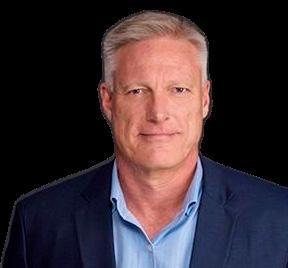
HRM ASIA.COM FEBRUARY/MARCH 2023 10 FEATURE CERIDIAN
“To stay ahead of the unexpected, organisations need a culture of change- readiness that is flexible enough to handle a variety of disruptions.”
Rob Squires is VP of Sales for Asia Pacific and Japan, Ceridian
About the Author
90% of su r veyed employees feel stuck in their roles
We surveyed 8,800 workers in our to learn what they value in their careers. Results showed there’s more to job flexibility than remote work and scheduling autonomy.
Discover how your organization can embrace flexibility to create meaningful careers for your people.
Download the research
 2023 Pulse of Talent
2023 Pulse of Talent
Creating a winning EX formula to retain your best talent
BY SHAWN LIEW
If employee experience (EX) encapsulates what employees encounter and observe throughout their tenure at an organisation, the uncertain global economic outlook is only serving to shine an even brighter spotlight on EX.
At organisations look to reduce hiring, a new lexicon has entered the workplace conversation, as Gartner recently highlighted when it identified the top workplace predictions for CHROs in 2023.
CHROs, said Gartner, will turn to “quiet hiring” to acquire new organisational skills and capabilities by essentially asking employees to take on responsibilities and tasks beyond their job description.
Regardless of employees’ willingness to assume more responsibilities, what can organisations do to prevent potential burnout and turnover in the long term?
An effective strategy, suggested Gavin Morse, Senior People Scientist, Culture Amp, is for leaders and managers to conduct regular one-to-one meetings to help employees set priorities and clear roadblocks.

Speaking with HRM Magazine Asia, he elaborated, “Our research shows that high performers are most motivated when they receive constructive feedback at work. Organisations should ensure they are continuing to provide meaningful development and growth opportunities alongside any increases in workload, which can help to support employee engagement and retention.”
“Measuring EX, including wellbeing and burnout risk, is crucial in this process. By collecting data and gaining insights, organisations can make more informed decisions to improve EX.”
The missing ingredient in the EX equation?
While employee engagement is critical for employees to feel a sense of belonging and purpose to their employers, many organisations are neglecting the importance of providing employees with autonomy and access to tools and systems that allow them to work efficiently.
Describing employee enablement as a crucial tool to boost productivity and enhance EX, Morse said, “This begins with thorough onboarding practices that enable employees to quickly become productive and remain with the company for a longer period of time.”
He also highlighted why organisations operating with a reduced workforce should examine the amount of time employees spend navigating inefficient or outdated systems and processes, which consumes time, creates fatigue and frustration, and negatively impact employees’ motivations to go above and beyond in their role.
“It’s also vital to remember that effective enablement is an ongoing process that requires continuous training, communications, and employee feedback to make adjustments and updates to work practices,” said Morse.
Elevating EX to retain your best talent
If organisations are looking for internal candidates to take on extra responsibilities, it is perhaps natural that they turn first to their topperforming employees.
These employees are not only more likely to succeed but may also be more motivated to upskill themselves as they look to enhance their careers. What then, can organisations do to improve employee engagement and provide a compelling incentive for top performers to stay and save costs on new hires?
A well-designed EX must include strong and inspiring leadership, career development opportunities, and meaningful feedback, suggested Morse, before adding, “Leaders can demonstrate their commitment to employee engagement by regularly communicating the company’s vision and values, and by empowering employees to take ownership of their work. Providing opportunities for professional growth, such as training and development programmes, can also help retain employees and keep them motivated.”
Reiterating that constructive feedback is essential to keep high performers engaged, he also encouraged leaders and managers to set clear performance expectations and provide regular feedback on an employee’s strengths and areas for improvement.
While this will help high performers feel valued and provide a sense of purpose, leaders and managers should also manage expectations in terms of displaying the tendency to ask high performers to take on most responsibilities and work tasks.
To better support employees, Morse advised organisations to promote more sustainable work practices that include offering flexible work arrangements, providing work-life opportunities, and encouraging employees to take time off when needed.
“By taking these steps, organisations can improve EX and retain their top talent for the long term,” he concluded.
Click here to find out how you can successfully map EX in your organisation.
HRM ASIA.COM FEBRUARY/MARCH 2023 12 FEATURE CULTURE AMP
“Organisations should ensure they are continuing to provide meaningful development and growth opportunities alongside any increases in workload, which can help to support employee engagement and retention.”
GAVIN MORSE, SENIOR PEOPLE SCIENTIST, CULTURE AMP.

FEBRUARY/MARCH 2023 HRM ASIA.COM 13 The Employee Experience Platform cultureamp.com Learn how to map out a continuous cycle of memorable moments that will keep employees engaged. Download this step-by-step guide. Improve every stage of the employee experience______________ A guide to mapping your employee experience 1
context The employee journey is not limited to the stages outlined above, as the broader organizational context is a crucial factor that must also be taken into consideration. Things such as your organization’s values, structure, and goals play an important role in establishing the standard to which an employee is holding the company. Ideally, there is congruence between what the company stands for and what is experienced. Employee Journey A guide mappingtoyour employee experience A Culture Amp worksheet FIG 1. EMPLOYEE AT WORK Start today
Step 2: Organizational
GET READY TO NAVIGATE THE NEW PARADIGM OF PEOPLE AND WORK
The countdown has begun for the highly anticipated HR Tech Festival Asia 2023, Asia’s largest HR technology and workforce management event, which is returning for its 23rd edition from 10-11 May.

With the theme of Engage. Sustain. Thrive. Navigating The New Paradigm of People and Work, HR Tech Festival Asia 2023 is taking place at the Suntec Singapore Convention and Exhibition Centre and will bring together some 5,000 C-suite HR professionals, business leaders, government officials, HR tech analysts and influencers, to discuss the most pertinent workplace issues faced by organisations in Asia.
As organisations continue to develop key strategies that will allow them to thrive in a world of world defined by change, a set of carefully curated conference sessions taking place across the Engage, Reimagine, and Innovate theatres will cover both the entire spectrum of HR practices and how HR technology can help
organisations navigate the new paradigms of people and work.
The conference sessions will also offer key insights into successful people strategies that will help shape the future of work.
For instance, in the world of HR technology and work, organisations tend to focus on technology and the physical, remote, or hybrid workspaces. In the process, they are overlooking a variable that will play a key role in shaping the future of work.
Tim Sackett, President, HRU Technical Resources, told HRM Magazine Asia, “We don’t focus as much on the people and what is really happening with them and this evolution of how work has changed and how people are changing work as well. As HR leaders and talent acquisition leaders, how can we adjust our strategies around that intersection of technology, work environments, and
HRM ASIA.COM FEBRUARY/MARCH 2023 14
FEATURE HR TECH FESTIVAL ASIA 2023
humans to make sure our employees are being the best employees they can be?”
In his keynote session on May 10, Sackett will break down the evolution of employees and what organisations can expect from future employees as artificial intelligence (AI) continues to automate many of the functions employees perform today.
He added, “I am so excited to be coming to HR Tech Festival Asia 2023, where I am going to be talking about people. I am going to be talking about humans. I am going to be talking about the future of employees and how over the last decades we have seen this massive evolution of humans and how they work. The future of work is amazing, but will that future be amazing for humans?”
Also joining HR Tech Festival Asia 2023 as a keynote speaker

is R “Ray” Wang, Founder, Chairman and Principal Analyst, Constellation Research. In his keynote address on May 10, Wang will examine the disruption brought forth by The Great Refactoring, identify key macro trends, and offer tips on how organisations can build resiliency, attract and retain talent, improve engagement, and plan for the next era in the future of work.
How can organisations help their employees find serenity in times of uncertainty?
During his keynote address on May 11, Martin Laschkolnig, Founder and CEO, Institute for the Development of Potential, will explain how employees can deal with the daily stressors life serves up and the role leaders and managers can play to help their employees find serenity.
“The first principal of creating an environment where people really do want to engage and thrive is that we need to create security. And while as team leaders we (probably) cannot make the pandemic and war go away, we can create a culture of mutual support and caring beyond what we had before the pandemic,” he said. (Read more on pages 18-19)
Other distinguished keynote speakers at HR Tech Festival Asia 2023 include Diana Wu David, Work Futurist and CEO, Future Proof Lab; and Josh Bersin, Global Industry Analyst and CEO, The Josh Bersin Company, who will be speaking live from the US on May 10.
Also joining HR Tech Festival Asia 2023 as conference speakers are, Amer Iqbal, Founder and CEO of 5 Ways To Innovate, who will discuss how organisations can harness the impact of the metaverse on the workplace; Dr CJ Meadows, Director, i2e, The Innovation & Entrepreneurship Centre, SP Jain School of Global Management; who will explain how organisations can deploy design thinking to engage, retain, and attract great talent in the new era of work; Gaston Carrion, Strategy & Consulting, Managing Director T&O /Human Potential APAC Lead & Global Employee Experience Lead, Accenture, who will unveil the new paradigms of people and work and highlight the strategic initiatives HR leaders should be prioritising in 2023; and Elisa Mallis, Managing Director and Vice President, APAC, Centre for Creative Leadership (CCL), who will examine the evolving role of CHROs in the region and look ahead to what is ahead for HR leaders across the Asia-Pacific region.
For visitors looking for the best technology solutions to support their HR and workplace transformation, HR Tech Festival Asia 2023 will also feature the region’s biggest HRfocused exhibition, featuring products, services, and technology demonstrations from some of the leading HR tech solutions providers and workforce organisations in the world.
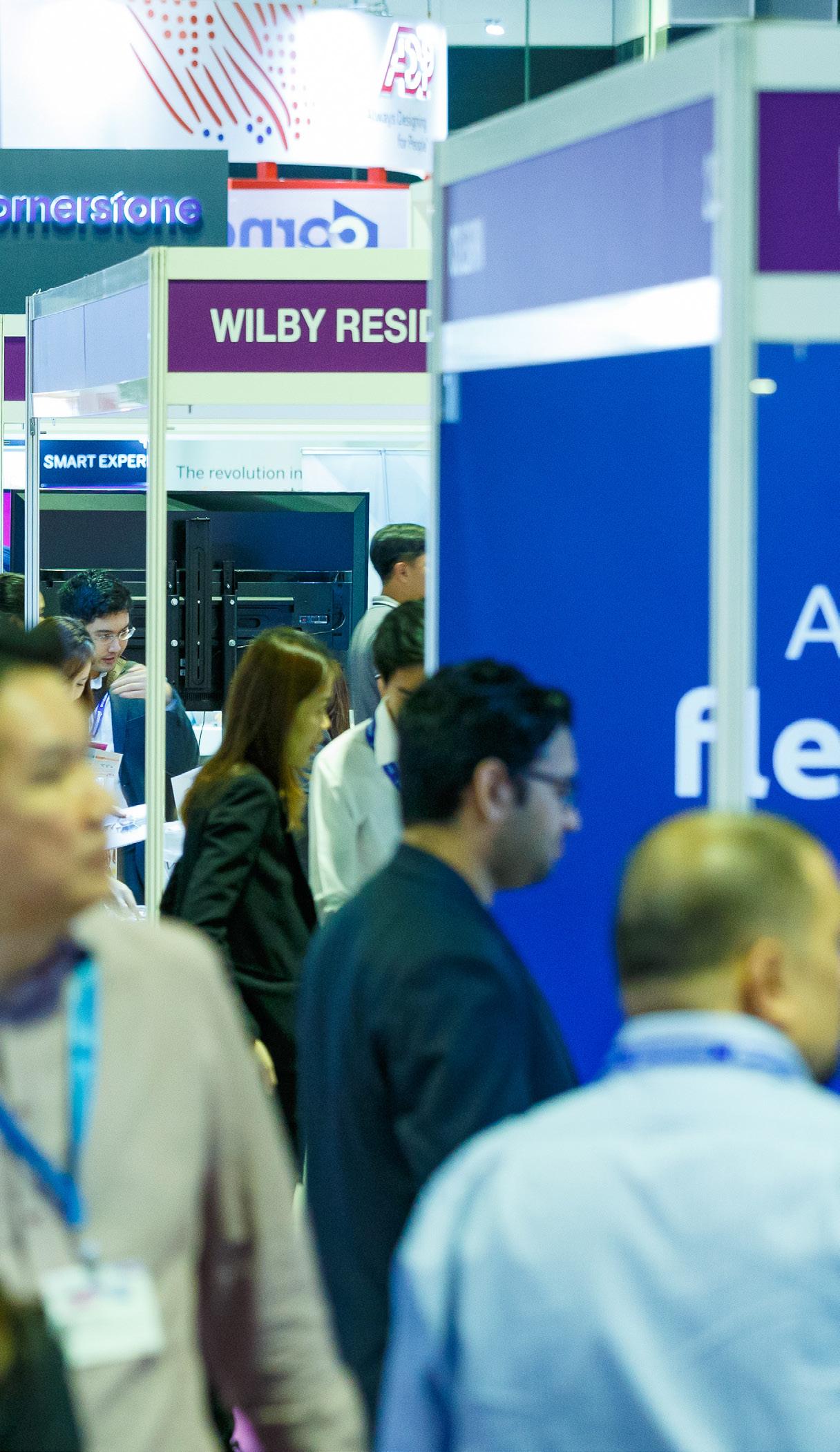
These include Achievers, Advantage Club, Culture Amp, CXC, Humanica, JobStreet, Modern Hire, Multiplier Technologies, Paradox, Remote, TAFEP, Visier, WorkJam, Wolters Kluwer, WSG, AMS, Howden, HR Path, Intellect, Akrivia HCM, Androgogic, BIPO, British Council, ChangeLeader, CIPD, Deel, Expat Insurance, Frontier e-HR, Giftano, JustLogin, Links International, Omni HR, Profiles Asia Pacific, Xpath Global, PeoplePlus, Singapore Science Centre, Summit Planner, 8nalytics, Int Labs, Octomate and Zapkad
Join these leading brands at HR Tech Festival Asia 2023 and read on to find what other highlights to expect this year.
FEBRUARY/MARCH 2023 HRM ASIA.COM 15
Celebrating the HR leaders and teams driving the success of APAC’s workforce
The annual HR Fest Awards will be returning alongside HR Tech Festival Asia 2023 to celebrate the best HR strategies, initiatives, and teams from across the Asia-Pacific region. This year, the HR Fest Awards will be presented in a live awards ceremony held on Day One (May 10) of HR Tech Festival Asia 2023, with organisations competing to win the top honour in the following prestigious categories:


• Employer of Choice
• HR Team of the Year
• Best HR Leader
• Best C-Suite Leader
• Best Workplace Culture and Engagement (above 500 employees) and (below 500 employees)
• Best Use of Technology
• Best ASEAN Human Development
An award newly added to the HR Fest Awards is the Best ASEAN Human Development award, which is presented in partnership with the ASEAN Human Development Organisation (AHDO) to recognise organisations that embrace fair and inclusive development of employees and stakeholders in at least two ASEAN countries.
Dr Bob Aubrey, Founder and Chair of the Advisory Board, AHDO, added, “This award is intended to recognise and promote progress in building a people-centric, fair, and sustainable workforce in ASEAN that is also productive and innovative at a world-class level.”
“By working together, stakeholders can create a supportive environment for human development in the workplace, which benefits both employees and employers, contributes to the region’s economic growth and realises the ASEAN socio-economic pillar of people-centred prosperity.”
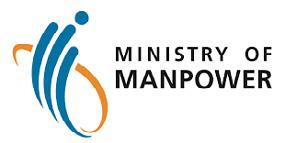
AHDO Summit returns with a renewed focus on human development
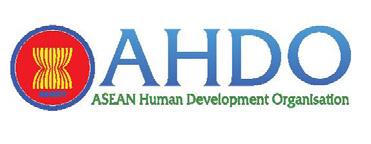
After a successful debut at HR Tech Festival Asia 2022, the ASEAN Human Development Organisation (AHDO) Summit returns with the goal to improve human development at work. With the theme of The Paradigm Shift to Human Development, this year’s edition will connect ASEAN’s national HR Association, senior human development professionals from across ASEAN, thought leaders and the ASEAN professional community to discuss, debate and establish a balance of economic and human development to the most diverse region in the world.
Join Dr Aubrey and speakers such as Nadiah Tan Abdullah, CHRO, S P Setia, and ADHO Regional Chair for 2023; Eddie Lee, Executive Director, AHDO, and Founder, Future of Talent Economy (FOTE) Network; Alvin Goh, Executive Director, Singapore Human Resources Institute; Mallory Loone, CoFounder, Work Inspires; Fong Tuan Chen, Senior Executive Vice President, Group Human Capital, Maybank; and more as they discuss how human development at work is a new paradigm that is replacing the traditional HR model.
The AHDO Summit is taking place on May 11 as part of HR Tech Festival Asia 2023.

ASEAN Future of Work conference examines the state of work in SouthEast Asia
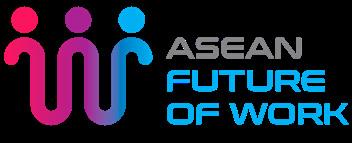
HR Tech Festival Asia 2023 is featuring the fourth edition of the ASEAN Future of Work conference. Organised in collaboration with Singapore’s Ministry of Manpower (MOM), the ASEAN Future of Work Conference brings together representatives from regional governments, unions, and the private sector to discuss best work practices as organisations in South-East Asia adjust to a post-COVID world of work.
Click here to register for HR Tech Festival Asia 2023 and be part of the discussion on how Asia’s HR community can successfully navigate the new paradigm of people and work in 2023!
FEATURE HR TECH FESTIVAL ASIA 2023 HRM ASIA.COM FEBRUARY/MARCH 2023 16
HR Tech Festival Asia 2023 will offer a selection of carefully curated conference sessions that cover both the entire spectrum of HR practices and how HR technology can help organisations navigate the new paradigms of people and work.
The annual HR Fest Awards will be returning alongside HR Tech Festival Asia 2023 on May 10 to celebrate the best HR strategies, initiatives, and teams from across the Asia-Pacific region.
NEXT-GENERATIONAL MOBILITY FOR THE MULTI-GENERATIONAL WORKPLACE IN A POST-PANDEMIC WORLD
With most organisations undergoing transformation, diversity of thought, skills, experience, and mindset has become an imperative to drive innovation and value. However, attracting, engaging and retaining the right people has never been more challenging.
The pandemic has led to a rapid paradigm shift in how we define work: employees across all age groups are now re-evaluating their lives and priorities, and many are leaving — or planning to leave — their employer in favour of organisations that enable their sense of purpose, provide greater flexibility, and give them the opportunity to redefine and (re-)align their career path to their interests, passions, and desired lifestyle.
According to the 2022 XYZ@Work Post-Pandemic Workplace Study, only 39% of employees want to stay with their current employer and career path. 15% want a different employer within the same industry, 12% want to change industry, 13% want to relocate to a new city/country, 12% want to stay with their current employer but on a different career path, 11% want to pursue further education, 10% want to start their own business, and 9% want to take a sabbatical.
This means great innovation is needed when it comes to career mobility. If employers want to build a solid workforce with the enthusiasm, skills and mindset needed to drive their business into the future, they will have to place more emphasis on skills and competencies versus traditional educational qualifications, and offer flexibility, purpose and multi-directional/multi-dimensional career paths.
Just a few years ago, career mobility was exclusively vertical. Organisations would compete by providing accelerated path to management for exceptionally talented individuals, and some would offer selected talent the opportunity to explore the world by expatriating them every few years. As a result, leaving an employer instead of having to figure out the politics and hidden barriers around moving up or across internally has long been a reality — especially for younger generations.
Now, everyone wants flexibility. 64% of employees say hybrid is the ideal working arrangement, and 25% want the opportunity to work fully remotely from anywhere. Purpose has also taken centre stage; 25% of employees now want to realign their career to a greater purpose. Besides millennials or Gen Zs, many Gen Xs and baby boomers are looking for career pivot opportunities that will lead to learning, new ventures and impact-driven roles.
Some employers are starting to think about their relationship with talent as a continuum, allowing employees to move and come back. Giving employees the chance to gain work experience with other organisations or industries allows them to pick up skills that are hard to come by in the industry, and that they can then bring back.

What does all this mean for Next Generation Mobility? First and foremost, it will involve more job-hopping and exploration of different opportunities, as well as a greater focus on career development and self-improvement.
Organisations will have to design paths that are not vertical or one-directional, facilitating movement of employees into new roles with speed and fluidity without slowing down their careers, but
also allowing them to work with greater flexibility, and to contribute to “the greater good” by working on high impact projects that strongly align to the causes they feel most passionate about.
This will require a strong understanding of the multi-generational workforce. Only by addressing the different generational needs and priorities, will companies be able to create tailored policies and programmes and more importantly, an internal mobility culture that is inclusive and accommodating to all employees. And the plus side is that greater flexibility and purpose leads to positive impact on mental health, which in turn leads to greater productivity, stronger team collaboration, more engagement and greater innovation.
Whatever the future holds, one thing is for certain. To design a future-proof career mobility programme, organisations will need a paradigm shift that considers the multifaceted needs and context of the modern workforce. This can only happen by co-designing across silos, working across organisations, and experimenting to create innovative programmes that maximise career satisfaction and organisational performance for the better.
To help us better understand how different generations define purpose and what organisations can do to enable their employees’ sense of purpose, we invite you to participate in a survey as part of the Purpose & Generations@Work 2023 study and we look forward to sharing the key findings with you soon.
FEATURE RACHELE FOCARDI FEBRUARY/MARCH 2023 HRM ASIA.COM 17
Rachele Focardi is Founder of XYZ@Work, Leading Future of Work Strategist and Author. To find out more how you can build the workforce of the future through Next Generation Mobility, join Forcardi at HR Tech Festival Asia 2023 on May 11 at 11.30am (SGT).
About the Author
SERENITY IN TIMES OF UNCERTAINTY
When we look at the state of the world – climate change, a pandemic and then on top of it war and unrest creating worldwide turbulences – it is not difficult to understand why many people are worrying when they consider their prospects for the future.
Having spoken with quite a few CHROs over the past year or two, many told me that the proverbial “fuse” gets shorter and shorter with many in the workforce and seemingly insignificant occurrences are enough to make them blow up or fall into depression. And while we can probably all relate to this, the question remains, what can we do to improve the situation – for ourselves and for the team members that we are responsible for?
First, we need to understand what is actually going on – the old myth that there is a work-life balance is just that – a myth. Life is not separate from work; work is a part of it and people bring their life with them to the workplace. If the barrel is already full to overflowing with private stress at home or from worries about a pandemic, a war or both at the same time,

well, then it is not surprising that not much is needed at the workplace to actually let it overflow.
The first and foremost thing to do is to stop ignoring the elephant in the room. Once we are ready to acknowledge that we are all in a difficult situation and we cannot simply demand from a person that is seriously scared to switch to “professional behaviour”, then we can come to an understanding that we need to be more compassionate with each other. The first principle of creating an environment where people really do want to engage and thrive is that we need to create security. And while as team leaders we (probably) cannot make the pandemic and war go away, we can create a culture of mutual support and caring beyond what we had before the pandemic. Humans are social beings and we can deal with adversity much better when we have a feeling of belonging and
feel that we are supported by a group that we know we can rely on, where we are ready to face what is coming together.
Secondly, it is a wise decision to reduce our zone of concern to where it matches one’s sphere of influence, as I call it. The problem is that when we get inundated with for example, world news that we cannot do anything about, it is very easy to feel overwhelmed and lost. Once we reduce our concern to the matters that we have control over, we will feel more empowered again.
After all it is each one of us who must decide as to how to deal with uncertainty. If we become aware that we always have the choice to “love it, change it or leave it” then we have already taken the first step to take our power back – to be in charge of what we actually are in charge of – our reactions to the events that are happening. We cannot change the events that happened,
HRM ASIA.COM FEBRUARY/MARCH 2023 18 FEATURE MARTIN LASCHKOLNIG
“The first principle of creating an environment where people really do want to engage and thrive is that we need to create security.”
and neither can we control the outcome, because life has too many variables that come into play. What we can control – and that is our responsibility – is our reaction in the present moment.

So, decide consciously to mostly care only about what you can influence and let the other stuff go - you cannot do anything about it anyway. A good first step could be to stop watching the news. Switch to written news, choose a reputable newspaper with actual information in their headlines, scan those to see whether there is something there that you absolutely must know about and skip the rest. It will do wonders for your serenity and your sanity on top.
Thirdly, create (or help team members create) routines of self-care. One can do this for oneself or also in a group. Examples for this are to adopt conscious relaxation routines for body and mind, like Yoga, meditation, Qi Gong or other practises like that. I personally love techniques from the field of Energy Psychology like “Tapping” or “Tapas Acupressure Techniques”. These techniques feature a physical component like tapping or holding acupressure points combined with introspection and reflection
to release the stress that we have built up while being exposed to life. I have been running groups to do these practises online since the beginning of the pandemic and the results are stunning. Find the routine that helps you, even just taking a walk in nature regularly can be very helpful –whichever it is and make it a regular habit. Any one is better than exposing oneself to a stressful environment without any break.
Fourthly, take care of your relationships. When the going gets tough, we need people around us who we can trust, who will listen and console us when stuff goes wrong, and help us back on our feet and support us. Be such a person yourself for your family, friends, and coworkers. If everyone is, we will fare much better regardless of what the future might hold.
And lastly, do not take things so seriously. Sure, give things the attention that they deserve, but keep also looking for the funny side of things, regularly put things in perspective to realise that most of the things we are making this huge fuss about are actually not all that important when we take a step back and consider them with regard to the bigger picture.
Therefore, serenity is not a destination, but a process. Just like we brush our teeth twice a day, because for some odd reason we keep up the habit of eating stuff, similarly we also need mental and emotional hygiene practices as we keep on chewing on the problems that life serves us every day anew. What new self-care habit will you intensify now, or will you adopt a new one?
Martin Laschkolnig is Founder and CEO of the Institute for the Development of Potential. For more insights into how you can help your employees re-centre themselves at work, join Laschkolnig at HR Tech Festival Asia 2023 on May 11, where he will be making a keynote address at 10.15am (SGT).

FEBRUARY/MARCH 2023 HRM ASIA.COM 19
About the Author
IS THE METAVERSE OUR NEXT REALITY OR IS THE HYPE JUST VIRTUAL INSANITY?
Igazed in wonder as the rising sun burnt away the mist and cast its warm yellow glow across the mountain range in the distance. The raw beauty of the majestic landscape in front of us drew audible gasps from the group of people travelling with me. A little later, we made our way down to the beach and collectively agreed to go scuba diving, a first for some of those present. Once we were submerged in the depths of the clear blue ocean, off in the distance we saw what looked like a large fish gliding through the water. A few brave individuals chose to swim up close, only to discover it was a shark. As they drew right up to its gills and reached out to touch its rows of razor-sharp teeth, suddenly the lights came up and the shark vanished. Our eyes squinted and adjusted to the brightness as we returned to the meeting room and got back to the rest of the presentation.
You see, I was standing in a training facility in front of about 30 HR executives from across a variety of industries who had come to learn more about the metaverse and the impact it will have on their business. The trip around the world we had just taken was completely virtual.
I have been asked to run a lot of sessions recently on the Metaverse, and wherever possible I like to include an immersive session. I find that experiencing the potential of a technology is a critical step in getting business leaders to believe in the impact it might have in the near future. Unfortunately, despite the hype and media coverage surrounding the metaverse in the past 12 months, this is where most of the narrative ends: Virtual Reality (VR) is great for gaming, Web3 is great for investing in crypto, but there is not much else to it. There has been very little conversation to help businesses make sense of how the metaverse will impact the way work gets done.
It raises a valid question: is the metaverse truly the next revolution that will transform the workplace as much as the rise of the internet or the mobile phone? Or is it all just a flash in the pan that will be discarded when the next shiny new thing comes along?

Metaverse and the workplace
Assumptions about technology in the workplace in 2023 mostly revolve around how we adopted mobile phones: first we bought a personal iPhone, then we installed an MDM or some clunky work software, and eventually ended up carrying around two phones. It was personal tech first, work tech second. This is not really a practical model for the metaverse.
Ben Thompson, tech industry analyst and author of the popular Stratechery blog, argues that the enterprise will actually be the killer app for the metaverse. In the 1970s, people first used computers in the workplace, and then wanted that same power at home, leading to the invention of the PC. In the same way, the metaverse is more likely to be a work-first technology, which enters the rest of our lives once it is more normalised. This perspective seems a sound bet: with Microsoft and Meta both investing billions into metaverse applications for the workplace, combined with the post-Covid shift to remote work, it is hard to imagine that an immersive technology that brings people together from around the world will not have a major impact on how we do work.
In fact, several notable companies have already begun implementing some version of this: Hilton have implemented VR as a means of training hotel staff in a staging environment that does not disrupt the customer experience, and Accenture have begun onboarding new hires virtually, allowing joiners from around the world to meet and even visit digital twins of some of their global offices.
Beware the hype cycle
In my former role at Meta, one of my final projects was developing a Metaverse Readiness Model that would help companies develop a pragmatic metaverse plan. Through our research we identified five increasingly mature use cases that businesses are likely to use the metaverse for over time:
1. Play - Delivering metaverse experiences through content. Think interactive marketing campaigns
HRM ASIA.COM FEBRUARY/MARCH 2023 20 FEATURE AMER IQBAL
where a QR code launches an Augmented Reality (AR) character you can interact with in a 3D space.
2. Explore - Bring consumers on a journey of exploration across time and geography. If you have ever tried on lipstick or sunglasses virtually before buying, you know what this is.
3. Learn - Immerse in training, analytics, and research, lowering time, risk, and cost required.
4. Create - Augment data and resources to give professionals a new way to do their jobs. Architects who can design a building while walking through it, or surgeons who can perform surgery from the other side of the planet will begin to emerge.
5. Connect - Collaborate without colocation. Connect people remotely, communicate via “See what I see” and enable individuals to view and interact with the same data. Eventually, geography will not be a limit to talent and hiring, organisational design and workforce planning will become borderless.
The discovery of these five use cases led to some useful insights. Firstly, it became clear that the metaverse industry is still in its earliest stages of maturity, somewhere between the “Play” and “Explore” stages. Secondly, when we analysed sentiment data on Facebook and Instagram through
this lens, it became clear that the huge early interest in the metaverse, followed by a nosedive in sentiment followed a classic hype cycle pattern. Like most new technologies, we can expect negative headlines and confusion about the metaverse for a while, with confidence stabilising to a more normal trend over time.
What is absolutely clear is that the metaverse’s hype cycle is following an almost identical pattern to game changing technologies that came before it. Early excitement has given way to a sophomore slump; but those companies who stay the course and continue to make small, pragmatic investments will be the winners over a longer horizon. Think about all those companies who ignored cloud computing in its early days and then had to invest astronomical amounts over the next 10 years in an attempt to catch up to early adopters.
The metaverse is not going anywhere. This is not a fad, it is the beginning of a movement that is going to dramatically change the way we think of work. Like all waves, it begins with a ripple and eventually becomes a tide of disruption for those who try to resist it. If you have not guessed by now, I am optimistic about the potential for this movement to bring positive change into the world, from decentralisation of power structures to democratisation of economic opportunity. There really is so much upside if we can work together to get this right. That is a reality I’m looking forward to
About the Author
Amer Iqbal is Founder and CEO of 5 Ways To Innovate. To find out more about how you can harness the impact of the metaverse on the workplace, join Amer at HR Tech Festival Asia 2023 on May 11 (12pm SGT), where he will be discussing the future of the metaverse.


“Is the metaverse truly the next revolution that will transform the workplace as much as the rise of the internet or the mobile phone?”
FEBRUARY/MARCH 2023 HRM ASIA.COM 21
PEOPLE EXPERIENCE AT THE HEART OF THE SONY EMPLOYEE JOURNEY
BY SHAWN LIEW
Operating t the intersection of music, entertainment, and technology, as well as boosting a diverse roster of thousands of artists from all over the world and a presence in more than 100 countries, it is perhaps not surprising that diversity, equity, and inclusion (DE&I) is never far from the thoughts of Sony Music Entertainment (SME).
For Wendy Weehuizen, VP, People Experience, Asia and Middle East for Sony Music Entertainment, another thought comes easily to mind: “Culture eats strategy for breakfast”.
Speaking to HRM Magazine Asia, she explained, “This quote from management consultant and author Peter Drucker is what guides my team and I in formulating and implementing policies for the region, spanning 12 culturally rich and diverse markets. Our artists, songwriters and creators are keen for their labels, publishers, or distribution partners to best reflect them and the markets they serve.”

“In turn, Sony Music Group has embraced our responsibility to move music forward in creating a more diverse, equitable and inclusive organisation, industry, and society. We develop initiatives, experiences and programming to actualise and advance our core DE&I values and beliefs.”
Sony Music offers education programmes and inclusive mental health and benefit offerings to help shape an empowering culture where employees of diverse backgrounds and personalities can thrive.
The Artists Forward Programme, for example, provides wellbeing support to Sony Music’s artists and talent in all aspects of their careers, while the Global
Social Justice Fund emphasises SME’s commitment to promoting positive societal change around the world by supporting social justice, equal rights, and anti-racist initiatives.
Weehuizen said, “In doing so, we hope that our people are motivated to support the development of local talent and artist communities, and work towards providing artists with the platforms and tools they need to reach their audience and grow their careers regionally and globally.”
“We aim to be the destination company for the most creative and diverse talent in the entertainment industry, where every employee and creator feels a sense of belonging and are empowered to amplify their creative potential.”
Retaining talent by aligning DE&I with employee experience
Like many organisations, Sony Music is today managing a multi-generational workforce comprising of four different generations of employees.
As the talent landscape continues to evolve, SME is proritising gender equality
in its leadership pipeline and enabling diverse experiences to support a highperformance culture. In this environment, employees are engaged, performing, and thriving, and encouraged to drive innovation, creativity, and growth by actively collaborating to overcome challenges and work towards shared goals.
Instead of being just a lofty corporate ideal, diversity is increasingly becoming a strategic imperative alongside Sony Music’s need to understand local audiences, Weehuizen revealed.
“Our people are the ones who reach out to and reflect the artists we represent. That makes creating a diverse workplace one of the many factors that influence our talent acquisition and retention strategies, alongside our strong commitment to develop and invest in local artist communities around the world,” she said.
In 2022, SME rebranded HR as People Experience (PX) to reflect a people-centric focus, which means putting people and their experiences first to grow brands and careers and attract talent to fuel sustainable business growth.
HRM ASIA.COM FEBRUARY/MARCH 2023 22 FEATURE SONY
“Sony Music Group has embraced our responsibility to move music forward in creating a more diverse, equitable and inclusive organisation, industry, and society. We develop initiatives, experiences, and programming to actualise and advance our core DE&I values and beliefs.”
WENDY WEEHUIZEN, VP, PEOPLE EXPERIENCE, ASIA AND MIDDLE EAST FOR SONY MUSIC ENTERTAINMENT.
At the heart of this strategy is proactively creating transformation to enable impactful and informed decisionmaking from a position of strength, as Weehuizen described, “Marrying how we work and how we experience work is a powerful combination as we evolve in how we show up for our employees against our long-term vision towards being a future-hit organisation.”
This was aptly demonstrated at the height of the pandemic when Sony Music faced the challenge of managing the transition to remote work. For some employees, especially those with clientand artist-facing responsibilities, not being able to hold face-to-face interactions took an emotional toll and created stress.
Other employees, meanwhile, were looking for more flexibility at work and wanted their needs and priorities as individuals to be recognised. “These factors gave us the push to enhance our employee experience, with the intention to build trust, commitment, and enthusiasm among our people and foster a caring
environment in which they can feel safe and perform at their best,” said Weehuizen.
Today, besides providing flexible work arrangements, offering mental health support and wellbeing programmes, SME also ensures that training and development opportunities are accessible to every employee.
The key, according to Weehuizen, is maintaining a hyper-localised approach when engaging employees across different markets. “Gathering feedback from the ground and being intentional in taking action to address real employee concerns is something that we are heavily prioritising, along with focusing on the moments that matter in our employee experience,” she said.
Capability building a top HR priority in 2023
While more organisations will look to prioritise employee wellbeing and create purposeful work in 2023, Weehuizen sees capability building as equally critical as companies ready themselves to leverage

HR technology to build an agile, datadriven organisation to build tomorrow’s digital and data demands.
Such competitive advantages that may surface as a result include skillsbased hiring, greater transparency in career pathing to facilitate self-driven, self-paced skills development in line with future business needs, and building in-market capability with a global growth mindset.
As for Weehuizen, a People Manager and HR Business Partner with over 20 years of experience working with global organisations such as Kantar, Maersk, Credit Suisse, and BP, prior to her current role with Sony Music, it is clear where her passion lies.
“In addition to continuing to cultivate a positive and people-centric work environment, I love to champion purposeful work as we offer flexibility, care and support to help our people achieve their personal and professional goals during their Sony Music journey,” she concluded.
FEBRUARY/MARCH 2023 HRM ASIA.COM 23
BUILDING A SOCIALLY RESPONSIBLE WORKPLACE THROUGH EMPLOYEE DEVELOPMENT
BY JOSEPHINE TAN
Investing in the professional development of employees is crucial for any organisation looking to achieve long-term success. Employees are developed at work when the management team creates a supportive and empowering learning environment that boosts skills, fosters motivation, and promotes professional and personal aspirations. It is through taking on this social responsibility that organisations can lay the foundation for a sustainable future and drive positive outcomes for both the organisation and its employees.
According to Dr Virgel C. Binghay, a Professor at the University of the Philippines’ School of Labour and Industrial and Co-Founding Member of the ASEAN Human Development Organisation (AHDO) Philippines, a socially responsible organisation has a duty to better society by upholding its promises and acting on ethical principles. All aspects of a business need to be considered, including employee treatment, the way the organisation is managed, the quality of services and products delivered, and the impact the organisation has on the environment.

Speaking to HRM Magazine Asia, he suggested that leaders who strive to have a strong sense of social responsibility in their organisations should possess two fundamental values: malasakit and workplace spirituality.
“The Filipino value known as malasakit emphasises having a compassionate demeanour towards other people,” Dr Binghay said. “It demands empathy towards individuals inside and outside of the organisation, as well as paying
attention to the circumstance in which they find themselves and their needs. Therefore, whenever leaders make malasakit a high priority, they take action to help address the problem of others by actively seeking solutions.”
As for workplace spirituality, it can potentially cultivate social responsibility in the workplace, particularly among employees, as Dr Binghay explained, “In its most basic form, workplace spirituality can be defined as a set of organisational principles mirrored in an organisation’s culture. These guiding principles help contribute to the connection between employees and their organisation and the promotion of a positive experience for employees in their work.”
Redesigning training programmes to meet the needs of employees
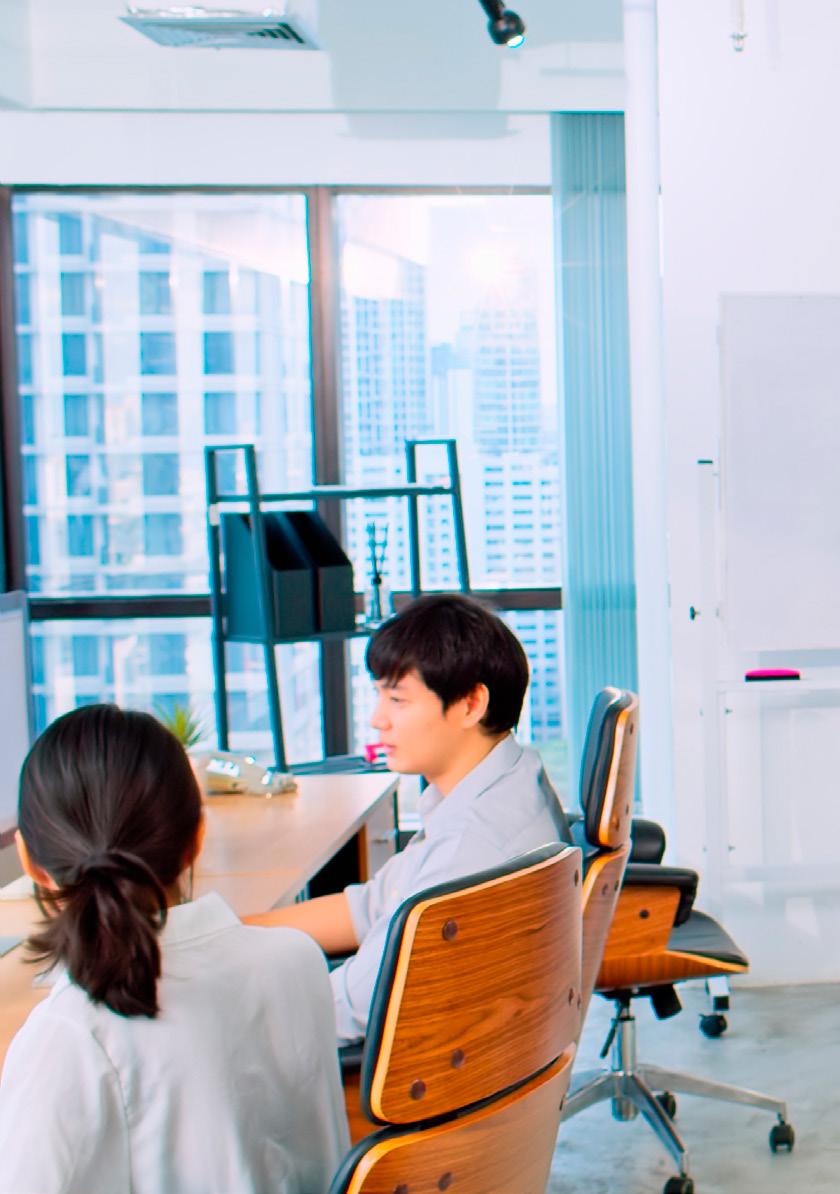
To help employees reach their full potential, organisations should develop employee development strategies that include the training and resources employees need to advance their careers and improve their skills.
These should also be based on the three key pillars of, full support from top management, the rigour of the learning process, and support from immediate supervisors, Dr Binghay identified.
Top management support in employee development is important, he emphasised, because a corporate culture that values professional development relies heavily on CEOs and corporate owners who are willing to invest time, money, and effort in their employees.
The rigour of the learning process begins by recognising that the cornerstone of an effective employee development programme is conducting a learning needs assessment. Organisations can then develop well-organised content that meets identified needs and support predetermined learning goals, use appropriate learning methods and approaches that
HRM ASIA.COM FEBRUARY/MARCH 2023 24 FEATURE AHDO
“HR professionals should look around to identify examples of effective HR practices and incorporate them in brainstorming new methods to transform HR in their respective organisations.”
DR VIRGEL C. BINGHAY, PROFESSOR, UNIVERSITY OF THE PHILIPPINES’ SCHOOL OF LABOUR AND INDUSTRIAL; AND CO-FOUNDING MEMBER, ASEAN HUMAN DEVELOPMENT ORGANISATION (AHDO) PHILIPPINES.
takes employees’ interests into account, and finally to evaluate if the programme has met its goals and objectives.
Support from immediate supervisors is also crucial, since they are responsible for implementing the learning and provide guidance, advice, and mentoring to employees. Dr Binghay advised organisations to implement a performance management system that can determine their employees’ learning requirements, while also cultivating a passion for continual learning.
He continued, “An organisation’s management team is primarily responsible for employees’ training and development. Such organisational intervention increases productivity, customer loyalty, competitiveness, and long-term sustainability. This intervention aims to improve employees’ work and life knowledge, skills, and attitudes.”
“The management team is responsible for the organisation’s growth, which is strongly linked to employee engagement and retention. They are responsible for this strategic agenda since any organisation needs competent employees to take on further organisational responsibilities and assume high-level positions.”
Preparing leaders for the future of work
The future of work requires leaders who can anticipate and adapt to change, and
who can provide direction and support to their teams in a rapidly evolving business world. Hence, training leadership has become a crucial aspect for the future of work as it equips leaders with the essential skills and knowledge needed to effectively lead and manage their teams.
Nurturing leadership qualities, such as strategic thinking, decisionmaking, emotional intelligence, and communication, can improve a leader’s potential to drive transformation, promote innovation, and cultivate a positive work environment.

Dr Binghay elaborated, “Leaders must be able to mould and reshape themselves according to the ever-changing conditions of the business environment to be relevant to the organisation. Hence, they should be able to learn new information swiftly.”
“They must possess a strong drive to find innovative solutions to corporate concerns and issues, and be willing and able to impart their expertise, especially to those who report directly to them. Additionally, they must exhibit honesty, integrity, and earn the trust of their employees, inspiring them to reach their full potential and perform at their best.”
To better support leaders in fulfilling their roles within an organisation, he suggested establishing a Management Development Plan (MDP), which focuses on creating successful and efficient
managers, help organisations build a talented and motivated leadership team, drive innovation and growth, and secure long-term success. The MDP should also take into account each participant’s career aspiration, as well as the organisation’s career development and succession framework, to ensure a harmonious relationship between organisational and individual goals.
HR influence in the workplace
When it comes to the design of training programmes and employee development initiatives such as a MDP, HR professionals play a critical role by taking into consideration the needs of participants and how these are aligned with the organisation’s goals.
To achieve this, Dr Binghay suggested seeking the mentorship or coaching of an experienced professional and even collaborating with an external consultant. “HR professionals should look around to identify examples of effective HR practices and incorporate them in brainstorming new methods to transform HR in their respective organisations. They should take a strategic approach to HR, complete with a scorecard, and establish measures.”
He also advised HR professionals to maintain a neutral and impartial perspective while considering the needs of both employees and management when carrying out their HR responsibilities. To promote ethical behaviour within the organisation, HR professionals should cultivate professional, friendly relationships with top management and line leaders, as these connections play a crucial role in the success of HR efforts.
“They need to keep a healthy relationship and communication with the workforce characterised by honesty and fairness, and ensure that employees are well cared for,” he concluded.
To gain more insights into how you can improve human development in your organisation, be sure to attend the AHDO Summit, which is taking place on May 11 as part of HR Tech Festival Asia 2023. With the theme of The Paradigm Shift to Human Development, the second edition of the ADHO Summit will examine how professionals inside and outside organisations are balancing profit with people and purpose.
FEBRUARY/MARCH 2023 HRM ASIA.COM 25
FUTURE-PROOFING THE WORKFORCE CAN START FROM WITHIN
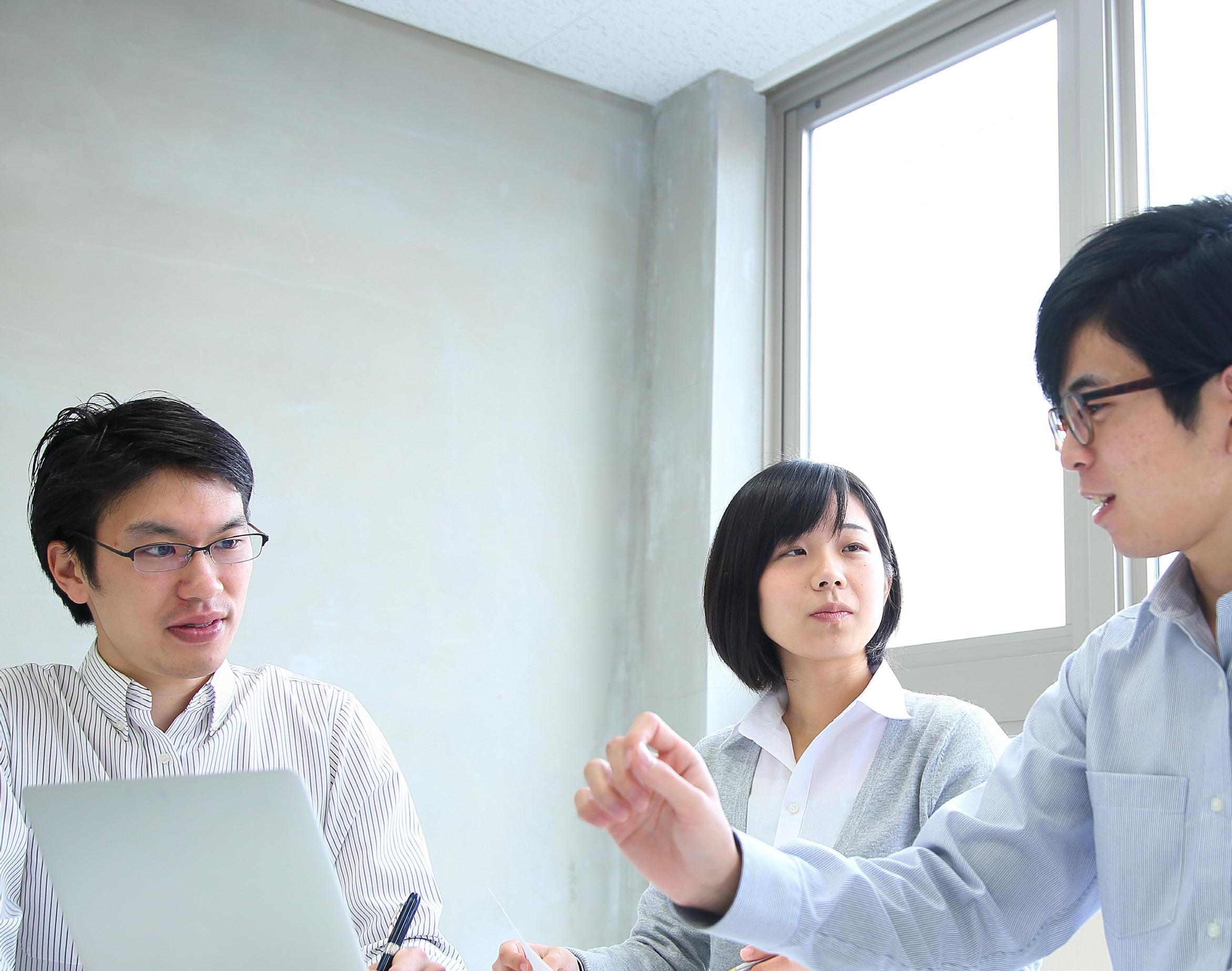
When thinking about future-proofing the workforce, many employers fail to look inside first. Either that, or they simply do not have visibility into what skills and capabilities exist already across their organisation. Instead, they amp up their hiring machines to source talent externally, failing to realise that research shows outside hires take three years to perform as well as internal hires in the same job. As the clouds of uncertain market conditions appear overhead and companies try to use costcutting measures as growth strategies, recruiting talent externally can cost at least twice as much.
The reality is that our world of work is changing more rapidly than ever before. World events are informing the skills and
capabilities required in the workplace. At the same time, employees have new expectations. People want to do meaningful work for employers that put the employee experience first, as illustrated by the recent wave of “quiet quitting.” Outdated notions of what motivates workers and how they want to work are being redefined.
Future-proofing the workforce is not just about offering hybrid work environments and flexible schedules.
Our research shows that despite over 75 percent of organisations having strategic priorities aimed at understanding, building, and mobilising their talent, less than half of HR have visibility into the skills and capabilities within their organisation. Researchers at McKinsey say taking a skills-based approach creates more resilient workforces. Skills are five times more predictive of job performance than
education and more than two times more predictive than hiring for work experience.
With all eyes on Davos, the World Economic Forum recently published its Jobs of Tomorrow research. Assessing the unmet need across ten countries to establish a better future for workers, they uncovered that these countries (Australia, Brazil, China, Germany, India, Japan, South Africa, Spain, the UK, and the US) will have gaps for 33 million healthcare workers and 21 million education workers. Green jobs will also increase, including agriculture and forestry workers (11 million); environmental, civil, and chemical engineers (more than 70 thousand) and environmental construction roles (almost 80 thousand.)
To safeguard the future of their organisation, HR leaders need to take a skills-based approach to building and
HRM ASIA.COM FEBRUARY/MARCH 2023 26 FEATURE ANNE FULTON
retaining talent. A skills-based model satisfies the needs of the employer and employees by recognising and rewarding the potential of existing talent and creating diverse talent pools. The skillsbased approach unlocks internal talent mobility, which improves engagement and retention. By providing access to growth opportunities and employee-driven career development, organisations can begin to create a culture of ongoing learning that fosters reskilling and upskilling.
While there is a natural tendency to believe external hires are more productive, research consistently shows otherwise. According to the Society for Human Resource Management (SHRM), promotions from within have a much higher probability of success than hiring from the outside. HBR highlighted that it takes two years for an external hire to
receive the same level of productivity as an internal hire and that performance review data indicates external hires are lagging in performance reviews for the first two years. The superiority of internal promotions over external hires increases at the higher levels of the organisation. Our own data shows that internal hires have much faster times to productivity because they know their way around the organisation and that institutional knowledge eliminates delays in being valuable from day one.
“Deciding whether the focus (and money) should be on recruitment or retention comes down to aligning the people strategy with the business strategy”, said Peter Fasolo, CHRO of Johnson & Johnson and Human Resource Executive’s 2022 HR Executive of the Year. “The key is balance, which comes from having a deep understanding of both your internal and external talent marketplace. The focus should be on identifying a capability gap and then determining the best way to address based on evaluating talent that is in high demand versus talent that is in high supply.”
A talent marketplace provides visibility to the skills and capabilities in the organisation and the skill gaps you need to close. It also enables you to communicate the in-demand skills the organisation has while connecting employees to the right learning content or mentors to help close those gaps.
Building your talent is your best strategy. Creating a bridge where you have a really engaged approach to your talent community enables them to see a future path to opportunities. Can they see that if they were to start as an account manager, they could become a director or VP in the future and see a roadmap for this? Can you engage your talent pools in these learnings so that they are starting faster? Are they ready, and are you connecting them to the right kind of learnings pre-hire, so you have an informed, engaged, and motivated talent pool?
Consider an example of how internal talent can be retained and redeployed cost-
effectively. When consumers were no longer visiting physical retail establishments, the role of retail merchandiser became diminished. These people possess communication and interpersonal skills, numerical and analytical skills, and can cope with pressure and unstructured requests. Shifting them into customer service roles means retaining these valuable employees while simultaneously filling positions needed for the future – workforce agility in action. And when employees know their company culture celebrates reskilling, upskilling, and enabling people to take on future job opportunities, they stay.
Upskilling and reskilling the workforce as a future-proofing measure requires learning and development professionals to be elevated to that rock star status, working in concert with managers. LinkedIn cited that 91 percent of employees say it is very or extremely important for their manager to encourage career growth, learning and development of skills. In the same findings, 84 percent of managers felt this could help close the skills gaps on their teams.
Providing employees with the opportunity to grow in their careers is a top priority for best-in-class organisations focused on future-proofing the workforce. And it is taking a skills-based approach to investing in the future of your people that will be the best enabler to future-proof your organisation.


“it is taking a skills-based approach to investing in the future of your people that will be the best enabler to future-proof your organisation.”
Anne Fulton is the Founder and CEO of Fuel50, a skills-powered Talent Marketplace solution with offices in New Zealand and California. She holds a graduate degree in Organisational Psychology from The University of Waikato.
FEBRUARY/MARCH 2023 HRM ASIA.COM 27
About the Author
Happy employees, happy company: Why organisations should listen to their employees
As the wave of tech layoffs continues to show no signs of abating in 2023, many employees are understandably jittery and on edge.
This is even though many organisations are, publicly at least, adamant that they are not planning to reduce headcount in 2023, hiring freezes notwithstanding. In the case of the latter, some organisations are essentially filling the gaps by asking employees to take on responsibilities and tasks beyond their job description.
And this is before we even start to address the elephant in the room. According to a 2022 survey by UOB, almost half of employees in Singapore have returned to the office on a permanent basis. The problem with that statistic, however, is how it goes against what employees want, with 80% of employees preferring some form of flexible work arrangement.
Should it then, be a surprise that many employees are frustrated, disengaged, or simply suffering from burnout?
Organisations that fail to address the concerns and challenges faced by employees are at risk of losing their best talent. While many employees may fear losing their jobs in the face of a looming recession, employees who truly excel in their profession are not likely to hesitate to leave for a better opportunity, nor are they likely to be short of offers.
While people strategies will differ from organisation to organisation, the lack of meaningful communication is arguably the biggest contributor to the disconnect that exists between many organisations and their employees.
In the instance of employees asked to take on increased workloads, do they understand and accept that these represent opportunities for personal development and career growth within the organisation?
If the arrangement is a temporary one, what assurances are given to employees and are managers communicating to employees that their wellbeing will always take priority?
Where the return to office is concerned, it is perhaps understandable why some organisations want their employees to return to the office. Bob Iger, CEO of Disney, cited the importance of in-person collaboration as the reason for asking employees to be in the office four days a week.
Instead of mandating a return to office however, employers
BY SHAWN LIEW
will do well to open lines of communication with employees and understand the reasons behind why they are reluctant to return to the office permanently.
As HRM Asia found out while speaking to organisations operating in the Asia-Pacific region earlier this year, a peoplecentric approach to flexible work wins buy-in because it addresses the concerns of employees and creates an environment for all employees to produce their best work for the organisation.


Unfortunately, some organisations seem to have taken a step back from the focus that was placed on employee wellbeing at the height of the pandemic. In today’s evolving world of work, decisions taken without consultation with employees, and which are contradictory to what they are looking for in their lives and careers, are arguably set up to fail.
Granted, there will be times when business leaders will have to make unpopular decisions, particularly during uncertain times. However, these decisions need not be detrimental to employee wellbeing and organisations’ ability to retain their best talent if they are accompanied by honest and open dialogue with employees.
If you are looking for more innovative and impactful ways to improve the employee experience in your organisation and maximise productivity, efficiency and ROI, HRM Asia invites you to join us at HR Tech Festival Asia 2023, Asia’s largest HR technology and workforce management event.
With the theme of Engage. Sustain. Thrive. Navigating The New Paradigm of People and Work, HR Tech Festival Asia 2023 is taking place at the Suntec Singapore Convention and Exhibition Centre from May 10-11.
To help organisations devise successful people strategies, HR Tech Festival Asia 2023 will take a deep dive into topics such as how HR technologies can enhance work productivity and employee welfare; how organisations can transform their L&D strategies to ramp up organisational performance; how organisations can improve work-life balance for their remote workforce; and how organisations can focus on the total wellbeing of their employees.
Join us in Singapore as we examine the new paradigm of people and work, and how organisations can benefit from how employees are continuing to change work.
HRM ASIA.COM FEBRUARY/MARCH 2023 28 TWO CENTS

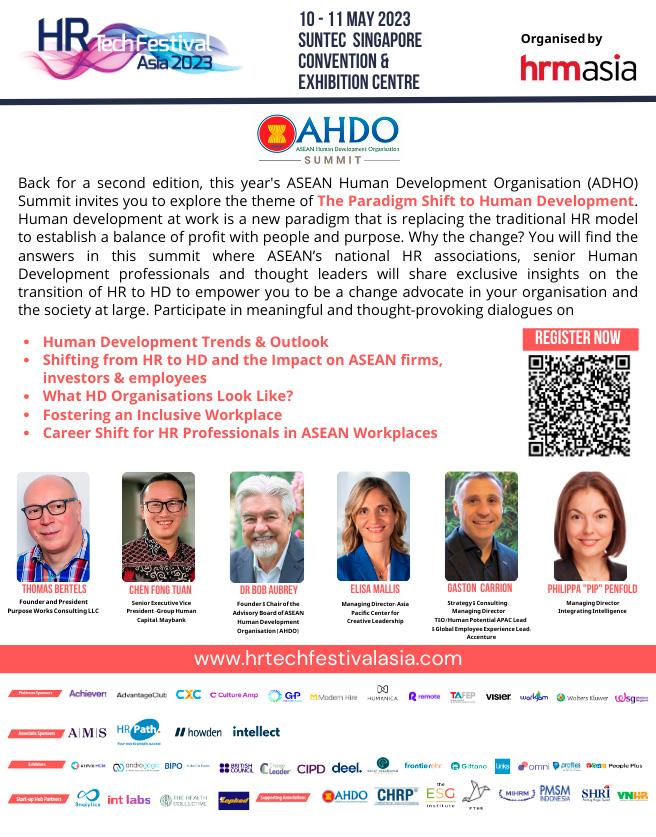

















 2023 Pulse of Talent
2023 Pulse of Talent









































